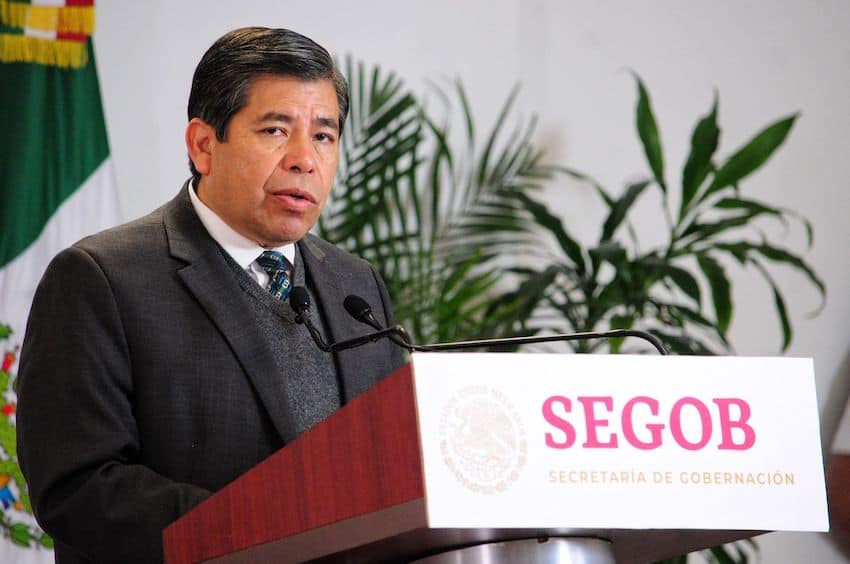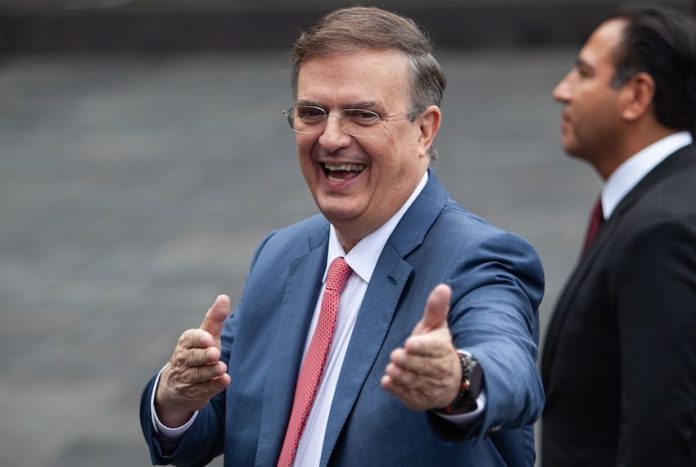Economy Minister Marcelo Ebrard said Monday that Mexico would impose retaliatory tariffs on imports from the United States if the incoming Trump administration slaps tariffs on Mexican exports.
“If you put a 25% tariff on me, I’ll have to react with tariffs and I’m your main importer, together with Canada,” he said in an interview with Radio Fórmula.
ENTREVISTA Marcelo Ebrard (@m_ebrard) saca su ‘as bajo la manga’ ante amenazas comerciales de Trump: “Si nos ponen aranceles, vamos a poner aranceles, y eso tendrá un costo muy grande para su economía; somos su principal socio comercial”. #FórmulaNoticias con @lopezdoriga pic.twitter.com/Rn5FasUxJd
— Grupo Fórmula (@Radio_Formula) November 11, 2024
“… And what does that lead you to? A gigantic cost for the North American economy,” Ebrard said.
His remarks came a week after Donald Trump pledged to “immediately” impose a 25% tariff on all Mexican exports to the United States if the government of Mexico doesn’t stop what he called an “onslaught” of criminals and drugs to the U.S.
Ebrard pointed out that Mexico is the United States’ top trade partner, and declared that the “first impact” of imposing tariffs on Mexican imports would be to “increase inflation” in the U.S.
He highlighted that Mexico exports a wide range of products to the United States and therefore tariffs wouldn’t just affect products made by the Mexican automotive industry but those produced by “many other” sectors as well.
Ebrard said that 25% tariffs on Mexican exports would cause prices in the United States to increase the day after they are imposed.
“I’m not talking about the medium term,” he said.
“This is an important limitation that has to be considered because we’re the No. 1 [trade] partner,” Ebrard said.

Mexico’s exports to the United States in the first nine months of 2024 were worth almost US $379 billion, while U.S. exports to Mexico totaled $253.4 billion.
Trade between Mexico and the United States — which have tariff-free access to each other’s markets under the terms of the USMCA — accounted for a record-high 15.9% share of total U.S. trade between January and September.
Ebrard said that not even Trump’s “main promoters” would agree with imposing tariffs that would have such a large impact on the U.S. economy and consumers.
“That doesn’t mean that he can’t put them on the table, but structurally we have conditions to play in Mexico’s favor,” he said.
Will history repeat itself?
In 2019, during his first term as United States president, Trump threatened to impose an initial 5% tariff on all goods from Mexico if the Mexican government didn’t do more to stem migration to the United States.
The two countries subsequently reached a deal that averted the blanket tariffs and resulted in Mexico deploying federal security force members to both its southern and northern border.
At a 2022 rally in Ohio for then U.S. Senate hopeful and now vice president-elect J.D. Vance, Trump asserted that he succeeded in pressuring Mexico to act in the United States’ interests.
He said he told Ebrard, foreign affairs minister at the time, that the U.S. would impose a 25% tariff on all Mexican exports if Mexico didn’t agree to what he wanted.

“And he looked at me and said, ‘Sir, it would be an honor to have 28,000 soldiers on the border, it would be an honor to have Stay in Fricking Mexico,’ Trump said, referring to the United States policy that required migrants seeking asylum in the U.S. to remain in Mexico until their U.S. immigration court appearance.
“… I’ve never seen anybody fold like that; they said it would be an honor to have 28,000 free soldiers, and for two years we did, and that’s one of the reasons we had the best numbers in the history of the border. Thank you very much, Mexico,” he said.
Trump appears determined to exert the same sort of pressure on Mexico during his second term as U.S. president, saying the day before the U.S. presidential election that he would inform President Claudia Sheinbaum of his 25% tariff plan “on day one or sooner.”
He said his plan has “a 100% chance of working” because if the 25% tariff threat “doesn’t work,” he’ll increase it to 50%, 75% or even 100%.
Tonatiuh Guillén, head of Mexico’s National Immigration Institute (INM) for the first six months of former president Andrés Manuel López Obrador’s six-year term, told The New York Times last week that what Trump is proposing now is a new version of “the same increased pressures on Mexico.”
“Mexico gave in to the pressures back then, and the question is whether Mexico will give in again. I think the likelihood it will is high,” he said.

Trump has also threatened to impose hefty tariffs on all vehicles made in Mexico, a move aimed at protecting the United States auto industry and dissuading Chinese automakers from attempting to enter the U.S. market via Mexico.
It remains to be seen whether he will follow through with his tariff threats, but they were a central part of his campaign rhetoric, and in his victory speech the president-elect said he would “govern by a simple motto: promises made, promises kept.”
The New York Times reported Tuesday that the consequences of U.S. tariffs on Mexico’s auto industry “would be profound, affecting the price in the United States of popular models like Ford Maverick pickups, Chevrolet Equinox sport-utility vehicles and several variations of Ram trucks.”
The Times also said the proposed tariffs “could severely disrupt suppliers” and “might also be a setback for the already slowing electric vehicle business.”
With reports from El Economista, El Financiero and Animal Político
